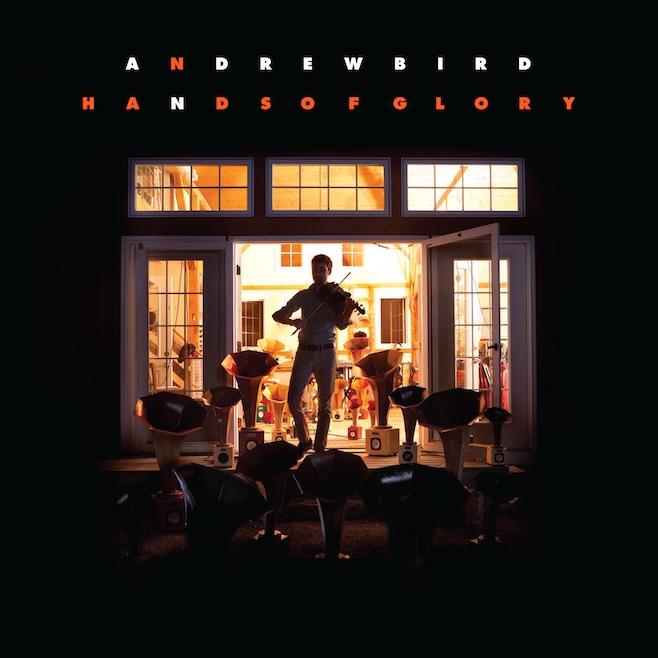
Andrew Bird’s music is in part defined by the way he marries the traditions of the fiddle and violin– two very different styles played on the same instrument. If March’s Break It Yourself was his violin album, full of careful pop-leaning arrangements, then Hands of Glory is its fiddle complement. It’s a set of rustic songs born of his old-timey live sets as well as the loose sessions at his barn in western Illinois, on the banks of the Mississippi River. Bird and his band cover country tunes, strip down their own originals, and explore such weighty Biblical issues as death and resurrection, sin and salvation, creation and Armageddon.
Hands of Glory possesses an almost academic quality, as though Bird and his cohorts were presenting a musical essay about endtimes imagery in country music. The album begins with “Three White Horses”, which, thanks to Bird’s bowing, sounds like it’s coming from an old acetate. That song is followed by a cover of the Handsome Family’s “When That Helicopter Comes”, an oddball gospel that deploys Alan Hampton’s bouncy bass and Bird’s otherworldly bow as a soundtrack to separatist paranoia: “There’ll be power in the blood, when the helicopters come.” Bird switches theologies for “Orpheo”, an austere reimagining of the spry “Orpheo Looks Back” from Break It Yourself, which thrives on the empty spaces between the strums and plucks, such that his gentle falsetto at the end has a beseeching effect. Only “Railroad Bill”, with its aw-shucks lyrics hoots and hollers, sounds out of place.
Nevertheless, Bird thrives in this setting, which permits greater emphasis on his stoic vocals and curious playing. He intuits Townes Van Zandt’s “If I Needed You” as a kind of secular hymn, directed to an ambivalent God rather than to a departed lover. His vocal cadence and mournful Appalachian airs evoke not so much a spiritual crisis but its resolution– a place of relative peace after so much soul searching. Those same qualities bolster the inventive storytelling on “Spirograph”, originally by the Minneapolis band Alpha Consumer. It’s neither old nor country, but Bird treats it with the same care he might bring to a dusty ballad.
Thematically and perhaps musically, closer “Beyond the Valley of the Three White Horses” is intended to evoke some sort of afterlife. It’s a lovely set of loops– long bows, staccato plucks, airy strumming, and ominous ambience– that draw equally from fiddle styles as well as violin styles, making it the most intriguing use of Bird’s instrument on the EP. It’s also the longest song on the album, unraveling gradually while never quite settling on one specific mood or theme. Instead, Bird constantly alters the shape of the composition, introduces new ideas, and lets them morph and mutate with each repetition. This technique is not necessarily new for Bird, but “Beyond” is a moment of subdued rapture, and, like the most bracing passages on Hands of Glory, it’s one that arises from the way in which Bird’s instrument inventively fuses these two disparate styles.
